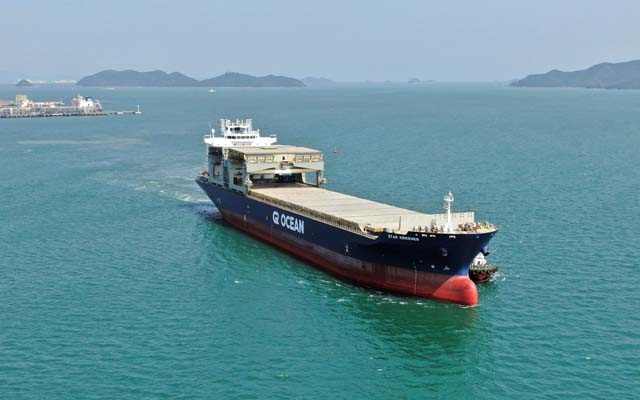Athens-based artificial intelligence (Al)-led maritime technology company DeepSea Technologies has announced the completion of a project supported by the EEA Grants under the ‘Business Innovation Greece’ programme, to develop an accessible AI solution for vessel performance routing.
Working with bulk shipping operator G2 Ocean and independent research organisation Sintef, DeepSea has run trials to develop a novel AI software solution which uses AIS and noon report data, together with high-frequency data from other vessels, to unlock voyage optimisation.
According to DeepSea, improvements in operational efficiency through optimised navigation help operators to reduce fuel consumption and lower emissions. However, few companies in the shipping industry have the data collection systems in place to support data driven improvements. Together with G2 Ocean and Sintef, DeepSea has developed an AI-based solution that can use the data available to every ship owner – AIS data and noon reports – to unlock the real benefits of performance routing. This approach, known as ‘transfer learning’, allows high-frequency data models from hundreds of vessels, already in DeepSea’s databases, to be transferred over to low-frequency data vessels of the same type and further adapted to available data.
The new software solution, Pythia Augment, has been applied to the bulker market for the duration of this project. However, DeepSea believes it has widespread applications for all vessel types, providing route and speed guidance for individual vessels based on AI-generated energy performance modelling. DeepSea and G2 Ocean applied the solution to five Grieg Star vessels within the Norwegian company’s fleet, to develop and pilot an AI model with the ability to produce accurate and optimised guidance that has been successfully applied to reduce fuel consumption and achieve the highest possible Time Charter Equivalent (TCE) for any given voyage. The ships used to test the solution provided a suitable training ground for developing the AI application, as the fleet features vessels operating noon reports as well as more modern live data acquisition systems.
During the project, DeepSea and G2 Ocean collaborated with Norwegian research organisation Sintef to understand barriers to end-user compliance. Breaking down barriers to the adoption of AI recommendations by the crew is seen as essential: the value of AI-driven optimisation to sustainable shipping operations can only truly be realised if there is high compliance with the recommendations produced.
Dr Konstantinos Kyriakopoulos, Co-Founder and CEO, DeepSea Technologies said: “Ship owners need to be taking action now to deliver on the maritime industry’s long-term goal to decarbonise. A mature market for the low-carbon fuels that will drive large-scale decarbonisation of marine energy remains some way away. In the meantime, owners and operators should focus on reducing energy consumption through operational efficiencies. With the delivery of Pythia Augment using low-frequency data to optimise voyage planning, we are creating a new and innovative way for bulkers to effectively drive down carbon emissions in their operations.”
Anne Lise Rognlidalen, Programme Director, Innovation Norway added: “Through the Business Innovation Greece Programme, which supported the Pythia Augment project, we support projects focused on innovation within the focus areas of Blue Growth, Green Industry Innovation, and ICT. We also encourage project collaboration, as well as projects which have a strong environmental impact. We are thus very happy to have supported the Pythia Augment project which was implemented by DeepSea Technologies in collaboration with two donor partners, G2 Ocean and Sintef. In particular, G2 Ocean and DeepSea worked together to support the improved performance of an important part of the Norwegian fleet. As home to the world’s fourth largest merchant fleet, Norway’s ship owners, as forward-thinking leaders in the maritime sector, can have a significant effect on the ongoing decarbonisation of the sector, and its efforts to achieve mandated net-zero targets in 2050.”
Arthur English, CEO G2 Ocean, said: “G2 Ocean is committed to becoming a net-zero emissions company by 2050 and is enthusiastic about the potential benefits AI powered technologies can unlock in our industry. The solution developed by DeepSea enables real time analysis of a range of commercial, technical, and environmental factors resulting in a reduction of emissions as well as optimised earnings. With the wide-scale adoption of green fuels still some way off, it is vital that we grasp the opportunities that are currently economically viable to reduce emissions.”
DeepSea says it has used two critical AI technologies to unlock voyage optimisation based on legacy data: Transfer Learning and Hybrid Modelling. Having access to a fleet with mixed data acquisition systems was paramount to the development of the AI tool.
Image: Pythia Augment brings AI-led voyage optimisation to technology-agnostic vessels (credit: G2 Ocean)



